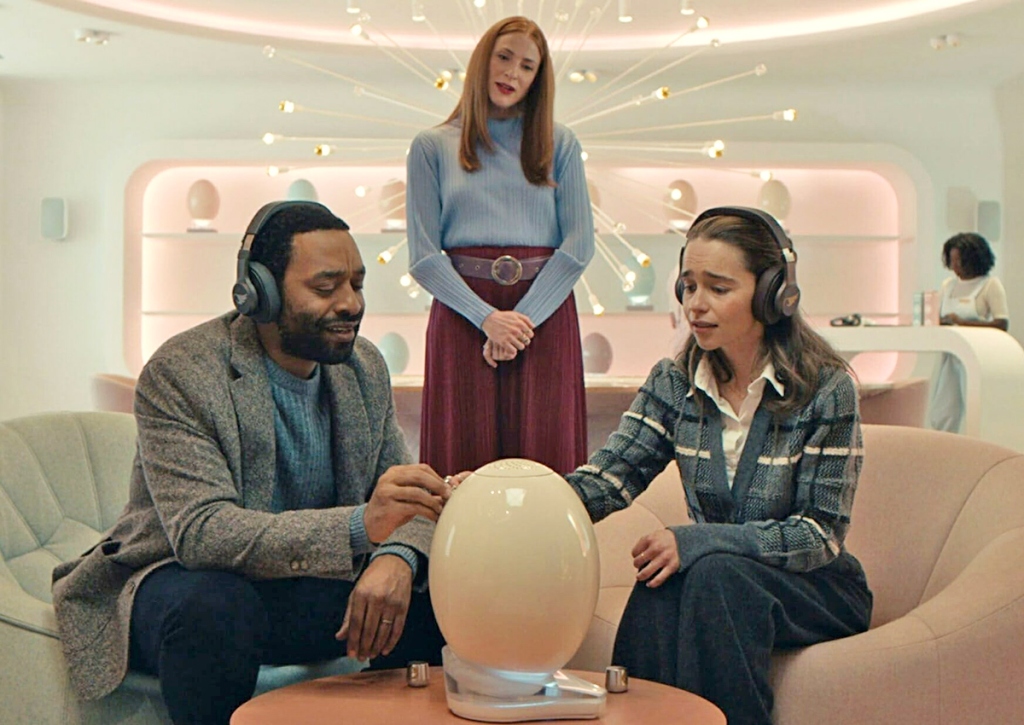
This wry sci-fi satire about our growing disconnect from nature tackles many timely issues, but is far too placid for its own good.
In a not-so-distant future, chipper AI assistants prepare your breakfast and morning coffee, monitor your wellness, conduct therapy sessions, and will even tell you off if they don’t hear the magic word once in a while. Countryside and nature walks are a thing of the past; instead, people prefer to relax and unwind in nature pods, or enjoy fresh air from the oxygen masks at special street bars. Everything is made safe, comfortable, convenient and awash in Instagram pastel colours.
Rachel (Emilia Clarke) and Alvy (Chiwetel Ejiofor) are a married couple with a choice to make. She is an ambitious high-flyer at a tech company, he’s a botanist with a passion for living things, a man out of step with the rest of the world. They’re thinking of extending their family one day, but how will this affect Rachel’s career? Not to worry: as a perk of her role, Rachel is offered an exclusive service at the Womb Centre, where women can outsource their pregnancies to an artificial womb. This freedom from natural processes is sold by the corporations as the latest in feminist empowerment, saving women from their own biology that holds them back.
On closer examination, the whole premise of the movie is flawed, concentrating entirely on pregnancy while giving no thought to what happens after the baby is born. There seems to be no corporate, technology-assisted plan for the care of the newborns, which is the actual main reason for women taking a long break from the workforce. Where’s the milk-squirting AI nanny, watching over the baby day and night?
The Pod Generation bypasses the messy topic of care to focus on the absurd and unnerving scenario of the parents watching their baby grow inside an egg-shaped device that looks like a sleek Apple product. They are allowed to take the detachable pod home from the Womb Centre for a time; despite Alvy’s strong reservations about technology, he becomes emotionally invested in the way Rachel can’t seem to manage, carrying the pod around in a harness like a proud parent and getting all sentimental and sappy.
On paper, there’s more than enough material here for some incisive social commentary. It’s too bad that the movie is ultimately too muted and soft-edged. Its insistence on keeping things light at all times negates any attempt to dig beneath the surface, whether it’s philosophical tensions between Alvy and Rachel or the creeping control of the mega-corporations, who in this future fund the education as well as pod-grown babies incapable of dreaming. This genial coasting stretches all the way into the third act, with a too-happy ending that waves away any serious consequences or complications.
In the end, The Pod Generation is basically an okayish, lightly amusing episode of Black Mirror turned into a feature film, but I also wouldn’t call it a waste of time. I really enjoyed the production design and the film’s vision of the candy-coloured future that’s not dissimilar to Spike Jonze’s Her. Though neither of the characters is especially well-rounded, and both are written more like mouthpieces for their respective world views, Clarke and Ejiofor are quite appealing in their roles. Hollywood should seriously stop wasting Emilia Clarke on stoic action heroines, and make more use of her natural likeability.

